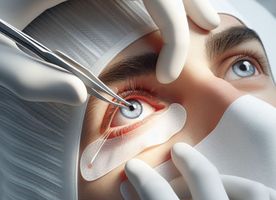Cataract Surgery in South Africa
Search and Compare the Best Clinics and Doctors at the Lowest Prices for Cataract Surgery in South Africa






Cataract Surgery at UCT Private Academic Hospital in Cape Town, South Africa





Cataract Surgery at Netcare N1 City Hospital in Cape Town, South Africa





Cataract Surgery at Ahmed Kathrada Private Hospital in Johannesburg, South Africa
Our partner clinics in are accredited by the following associations















































































































































No Time?
Tell us what you're looking for and we'll reach out to the top clinics all at once
WHY US?















































































































































No Time?
Tell us what you're looking for and we'll reach out to the top clinics all at once
What does a Cataract Surgery Procedure Involve?
The cataract surgery procedure typically involves a skilled ophthalmologist creating a small incision in the cornea, the clear front part of the eye. Tiny instruments are then used to break up the cloudy lens, which is then removed. An artificial intraocular lens (IOL) is inserted to replace the natural lens.
The surgery generally takes about 30 to 45 minutes. It is usually performed under local anaesthesia that numbs the eye, so the patient stays awake but feels no pain. The procedure can be carried out on an outpatient basis, meaning that patients can go home the same day after a short recovery period in the clinic.
How Long Should I Stay in South Africa for a Cataract Surgery Procedure?
If you're travelling to South Africa specifically for cataract surgery, it's advisable to plan for a stay of at least two to three days. This time allows for the pre-operative assessment, the day of the surgery, and a postoperative check-up before travelling home.
Staying a bit longer provides time for the eye to start healing and allows for a follow-up examination to ensure everything is well. It is always essential to discuss staying duration with your healthcare provider before making any arrangements.
What's the Recovery Time for Cataract Surgery Procedures in South Africa?
Recovery times for cataract surgery procedures vary from person to person, but typically, patients notice an improvement in their vision within a few days of the procedure. However, full healing can take about a month.
During the first few days post-operation, the eye may feel itchy and sensitive. It is also common for a mild burning sensation or grittiness to be experienced. Patients are advised not to rub the eye and to use the prescribed eye drops to help with the healing process and reduce inflammation. Complete visual results and the settling down of any post-operative symptoms could take from several weeks to a few months.
What's the Success Rate of Cataract Surgery Procedures in South Africa?
The success rate of cataract surgery procedures in South Africa is very high, similar to other developed regions. As a mature and well-established procedure, the percentage of patients with significantly improved vision following cataract surgery is greater than 95%.
However, as with any surgical procedure, there are risks associated. These risks mainly involve infection, bleeding, inflammation, detachment of the retina, pressure changes in the eye and sometimes light sensitivity. Most of these complications are extremely rare and can be managed effectively if they occur.
Are there Alternatives to Cataract Surgery Procedures in South Africa?
While there is no definitive alternative to cataract surgery, there are some possible management strategies to delay the operation. These may include:
- Changing eyeglass prescription, sometimes the nearsightedness caused by cataracts can initially be corrected with glasses
- Using a magnifying lens for reading
- Enhancing lighting conditions at home or workplace
- Using anti-glare sunglasses or brimmed hats outdoors
However, these alternatives only address the symptoms rather than the underlying cause, the cataract itself. Once the cataract impairs the quality of life significantly, surgery will likely be recommended. Make sure to discuss the best course of action with your healthcare provider.
What sort of Aftercare is Required for Cataract Surgery Procedures in South Africa?
Aftercare is vital for a successful cataract surgery outcome. You will be prescribed eye drops to prevent inflammation and infection. These must be used according to the prescribed schedule. It's essential to prevent anything from bumping into your eye or any unnecessary pressure.
Follow-up visits will be scheduled to monitor your healing process. Patients are usually instructed to wear a protective eye shield while sleeping for a week or so after surgery. Activities like reading or watching television can resume soon after surgery, but strenuous activities or heavy lifting should be avoided for several weeks.
This information has been accurately sourced and verified by a medical professional for its accuracy, however, we strongly recommend you to consult with your doctor before pursuing medical procedures overseas.


